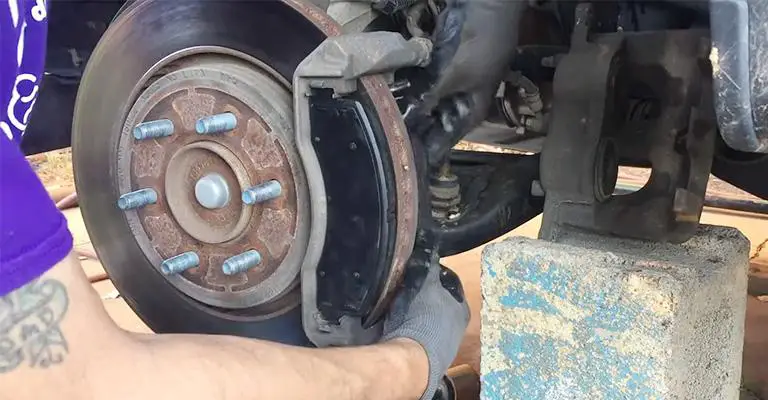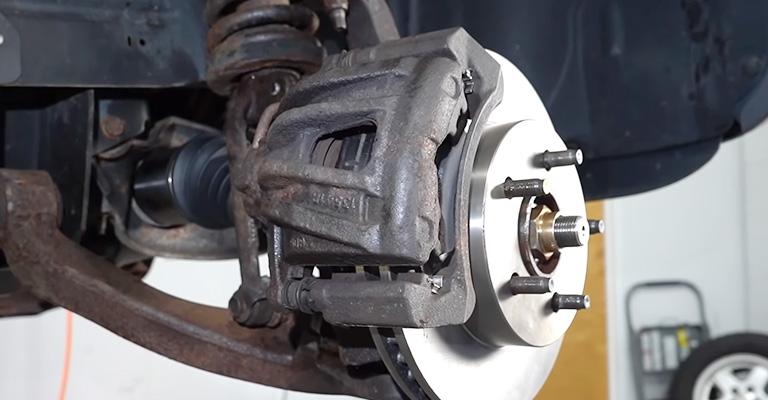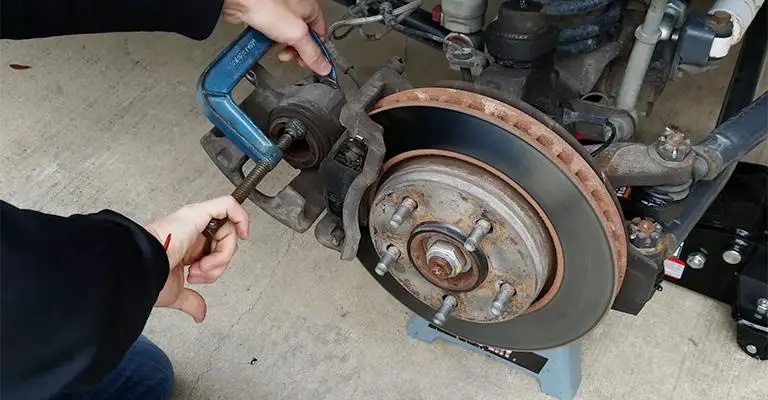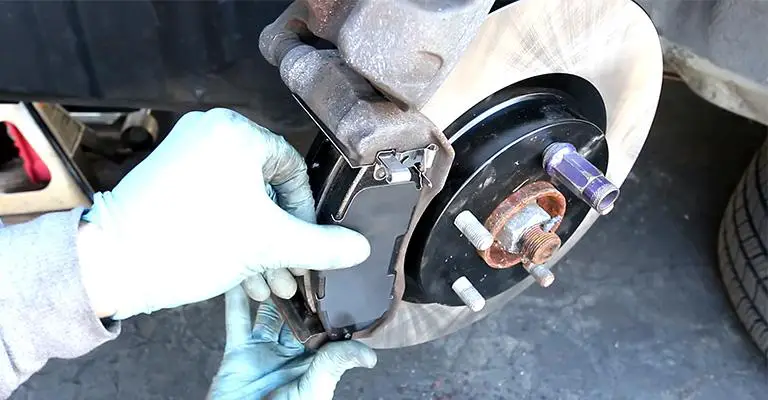If you recently changed the pads on your vehicle’s brakes and are now locking up, it can be frustrating and potentially dangerous.
This blog post will explore common causes of brakes locking up after changing pads and what you can do to fix the problem.
It’s essential to promptly address any issues with your brakes to ensure that your vehicle is safe to drive.
Whether you are a car owner or a mechanic, understanding the potential causes of this problem can help you identify and fix the issue more effectively.
So, if you’re experiencing brake lock-up after changing the pads, read on to learn more about what might be causing the problem and how to fix it.

Contents
Brakes Locking Up After Changing Pads | Possible Reasons Explained
There are several possible reasons why your brakes might be locking up after you change the pads. Here are a few things you might want to consider:
Incorrect pad selection: If you installed pads that are not compatible with your brake system, they might not function properly, potentially causing the brakes to lock up.
Misaligned caliper: If the caliper is not properly aligned with the rotor, the pads may not make full contact with the rotor, which can cause the brakes to lock up.
Contaminated brake fluid: If the brake fluid is contaminated with water or other contaminants, it can cause the brakes to malfunction, potentially leading to lock-up.
Air in the brake lines: Air in the brake lines can cause the brakes to feel spongy and potentially lock up.
Worn brake components: If other brake components, such as the rotors or calipers, are worn, it can cause the brakes to lock up.
It’s important to identify and address the root cause of the problem to ensure that your brakes function properly and safely. If you cannot diagnose the issue on your own, having a mechanic or a professional brake technician take a look at your vehicle is a good idea.
Why Do My Brakes Locking Up After Changing Pads?

It is possible for one or more of the brakes on your vehicle to lock up for a variety of reasons. Among these is an overheated braking system, using the wrong brake fluid, broken or damaged parts (calipers, brake pads, pistons, rotors, and others), a defective ABS component, a broken parking brake, etc.
When dealing with a lock-up, diagnosing a brake problem doesn’t matter if you’re experiencing it. There are two scenarios where your brakes can lock up: when you least expect it (and do not engage the brake pedal) and when you apply excessive pressure.
More About Seized Brake Caliper
Your car’s brake calipers are one of the most important parts of its braking system, yet they can malfunction and cause other complications.
If your brake caliper pistons are not maintained properly, they can seize, adversely affecting your vehicle’s braking capacity.
To provide you with the reliable braking performance, your brake calipers must withstand numerous adverse changes in temperature. It is believed that constant changes to the piston can cause the piston to decay (harden or crack).
A caliper’s piston can erode when wet for too long, causing it to seize when moisture seeps into it. It is most likely that your vehicle will seize when it is not being used frequently.
Because of this, the moisture on your discs is usually cleared away when you brake. It is typically a sign that you need new brake calipers when your brake pads have worn down excessively.
When you have worn-out brake pads, your disc brakes will be damaged. When one of your brake calipers seals up, you’ll need to use the disc and pads on the other side of the vehicle to hold the vehicle together.
In this situation, your car may pull to one side whenever you brake hard (which can pose a road hazard). Over extended periods, faulty brakes will eventually overheat from excessive use, making repairs and replacements more costly.
In this case, we recommend you take your car to a local garage as soon as you notice any signs that your calipers are sticking. Breaks malfunctioning or failing should not be taken lightly since they can cause severe injuries and fatalities.
How to Fix Locked-Up Brakes?

If a brake lock-up occurs, it is imperative to determine the root cause. An examination of the property often necessitates a thorough visual inspection.
Inspect a vehicle’s front and rear brakes for signs of abnormal wear and component damage. Any deficiencies discovered during this inspection should be corrected before resuming normal operation.
There are multiple ways to identify the malfunctioning brake assembly, such as smelling burnt, finding excess brake dust, or observing blueing on the components’ rotors or drums. It is recommended to replace all brake components at that wheel end if signs of such an event are discovered.
In addition, it may be necessary to replace the same components at the opposite wheel end of the same axle. Replacement of brake pads on two axles should always be done in pairs, at the very least.
A wheel ends up overheating as the result of brake locking up may actually compromise its bearing in extreme cases. Consequently, subsequent replacement is necessary.
When all repairs have been made, performing an initial brake test in a quiet, isolated location such as a parking lot or driveway is always advisable.
You may want to conduct a more thorough test drive on a nearby roadway if everything seems to be running smoothly. Whenever further additional issues become apparent during your test drive, you should discontinue it for additional evaluation.
Consult a professional for advice if you are unsure whether to repair your vehicle’s brakes following a lock-up. The act of seeking a second opinion or hiring a professional to make repairs is not shameful.
Break In New Brake Pads Properly

You should avoid heavy braking or panic stops for at least the first few hundred miles. It usually works just fine to seat most brake pads under normal driving conditions, provided the rotors are clean, relatively smooth (no excessive scoring or grooving), and flat (no warpage or pedal pulsations). You should resurface or replace rotors that are in poor condition.
Keep The Rotors Clean
It is also important that the rotors are clean. The importance of this cannot be overstated, as dirt, rust, grease, brake fluid, or metallic residue left behind from resurfacing the rotors can interfere with the seating process, causing noise, pad contamination, and uneven braking.
Wash off any oily anti-corrosion coating on your brake rotors by using brake cleaner or hot soapy water and brushing.
Most of the coating has been removed when rubbing off a few normal stops on a new set of rotors with an anti-corrosion phosphate coating on the worn surfaces. To seat the pads once the coating has worn off, follow these steps:
Several brake experts recommend breaking in new brake pads with a 30-30-30 procedure: 30 gradual stops ranging from 30 mph to 30 mph and 30 seconds in between stops for the brakes to cool. The pads will not get too hot until after the resins have fully cured because of this procedure.
It is possible to use the 60-20-10 procedure by gradually braking from 60 mph to 20 mph, alternating between moderate pedal pressure and braking (without stopping each time).
As soon as you have applied the brakes, accelerate back up to 60 mph and drive without braking for several minutes; this will allow the brakes to cool. The initial bedding process should be completed by bedding the pads in this manner.
Avoid Panic Stops
Hard panic stops or high-speed braking should be avoided until new pads are fully seated. If you slam on the brakes with a new set of brake pads, the pads will overheat and glaze. As a result, the pads will be noisy, and they will be less effective when it comes to braking.
Final Words
You may find it difficult to detect issues with your vehicle if you are inexperienced or unfamiliar with mechanical systems. Understanding your vehicle inside and out is necessary to establish problems and find solutions.
You know how important it is to keep your car’s brakes in good working order. In addition to frequent use, they are one of the things that need more maintenance during travels.
